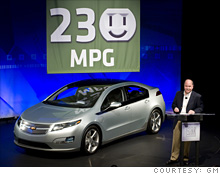MPG isn't entirely meaningless for an electric car. We know how much BTU is in a gallon of gas. That can be converted to KWh and then the comparison can be done.
You are right, you can. But I'm not sure that tells anybody what they want to know.
http://www.evworld.com/library/energy_numbers.pdf
However, an electric motor uses a KWh of electricity much more efficiently than an ICE uses the same energy content in gasoline. So we can equalize KWHrs and gasoline energy content, but then what? Plus, do we need to back to the plant to see how much fuel *they* used to generate that KWHr? And that still leaves the variable of how much gas you use depending on how long your drive is (% of time on plug-in power). And since gasoline and electricity don't cost the same, and the prices change, what do we learn from it? I think it creates more problems than it solves.
I think people want to know what it is going to cost them to fuel the car for a month or year of driving, regardless of which fuel it used. And initial cost.
After that, maintenance pros/cons, battery replacement versus ICE maintenance, environmental (carbon emission/mile?) issues come into play.
And before that - emotion will come into play. Some people will just want one - because it is electric. Heck, I want one too, I think it would be cool. But for me, the numbers have to at least come close. I'm afraid I'll be waiting a while.
Here's a parallel: Hours of battery life on a laptop. There are many technical factors - the size of the battery, the efficiency of the laptop, the tasks one is doing, screen brightness etc. While it is far from perfect, I think the computer companies have developed some standard profiles, and rate hours of battery life on that. Not perfect but not bad for comparison shopping. If the consumer really wants 6 hours of battery life, they may not care much if it was done with efficiency or a larger battery or a combination - but they want their 6 hours. After that, if the laptop is too big (because of a huge battery), or the screen too small (to increase battery life), the consumer can weight those factors. But at least they got a battery life number that means
something to them.
-ERD50





